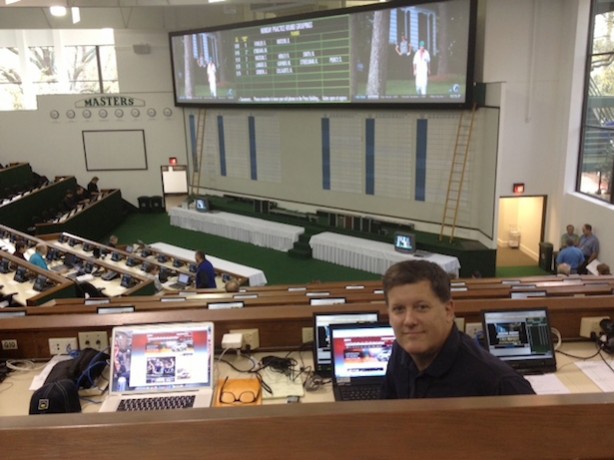ESPN.com staffers cover golf’s majors from dawn to dusk and beyond

AUGUSTA, Ga. — With the year’s first golf major, the Masters, underway this week at Augusta National Golf Club, ESPN.com’s golf team has been on-site at the event all week.
Bob Harig, senior golf writer for ESPN.com, says that majors such as the Masters keep him and his fellow reporters Farrell Evans and Michael Collins, as well as columnists Gene Wojciechowski and Rick Reilly and editor Kevin Maguire, very busy. And with the immediacy of Internet reporting, it means all will write multiple stories, blogs and columns each day, in addition to other responsibilities.
“The majors are very long days, especially the first two days,” Harig said. “The competition starts first thing in the morning and goes until dark and there’s things that are occurring all along the way.
“It’s nothing for Tiger [Woods] to tee off at 8 a.m. one day and maybe 1:30-2 p.m. the next day or vice-versa.”
Because of the high level of interest in Woods, ESPN.com’s coverage typically will revolve around him, especially at a major.
“We kind of zero in on when he’s playing and try to be prepared to write something or react to what he does almost immediately, good or bad,” Harig said.
“And then we build from there. There might be early stories, guys who play early, shoot a low score, that we’re going to try to react to, so we’re just kind of scrambling, just trying to get a sense of what’s happening and a feel for how the day is going.”
Harig follows the play in the media center, often dashing out to interview players when they’ve finished their rounds, and he usually tries to walk nine holes each day while observing Woods or another player who’s in the hunt.
“I’m just trying to see some things with my own eyes,” he said. “Get a feel for what the conditions are like, what the crowd’s like.
“At the Masters, pretty much anything that occurs in the morning is not on live TV, so if you want to watch a guy play Amen Corner, you’re going to have to get out there yourself and go check it out.”
While writing is one of Harig’s main jobs at a major, it’s not all. He’ll also do multiple interviews for ESPN Radio affiliates around the country and often does on-camera work for SportsCenter as well as the website. A day that saw him arrive at the course around 7 a.m. may not see him depart until 10 p.m. or later.
And then he does it again the next day.
“The days are long but there’s nothing like the feel of a major like the Masters,” he said. “I’m fortunate to be able to do what I do and be part of a great team.”







